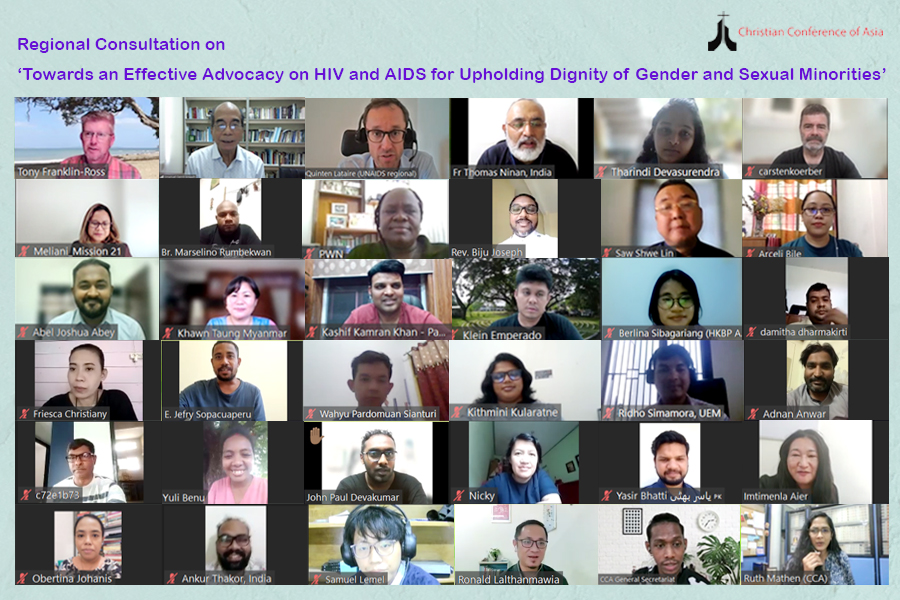Upholding dignity of gender and sexual minorities must be priority when designing HIV and AIDS programmes within Churches
 Participants of Regional Consultation on ‘Towards an Effective Advocacy on HIV and AIDS for Upholding Dignity of Gender and Sexual Minorities’
Participants of Regional Consultation on ‘Towards an Effective Advocacy on HIV and AIDS for Upholding Dignity of Gender and Sexual Minorities’
A two-day Asia regional consultation on ‘Towards an Effective Advocacy on HIV and AIDS for Upholding Dignity of Gender and Sexual Minorities’ reinforced the need to have dialogue, to open discussions and deliberations aimed at building a community where no one is left behind, and to uphold, on a priority basis, the dignity of gender and the needs of sexual minorities.
Organised by the Christian Conference of Asia on 24 and 25 March 2022 as part of its Action of Churches Together in Combating HIV and AIDS in Asia (ACTHAA) programme, the consultation which was attended by over thirty participants reiterated the need for designing effective advocacy strategies in dealing with HIV and AIDS.
The participants emphasised the importance of addressing human sexuality in a comprehensive manner so as to initiate effective HIV programmes in churches.
During a session on an overview of legal barriers in Asia, particularly those faced by gender and sexual minorities, Quinten Lataire from UNAIDS Asia Pacific observed that the criminalisation in society against people living with HIV and AIDS violated human rights, including the rights to health, privacy, equality, and non-discrimination, thus impeding HIV treatment and prevention.
Mr Lataire further shared studies during his presentation that demonstrated how transgender people who had experienced stigma in health care were three times more likely to avoid health care than transgender people who did not experience such stigma.
The UNAIDS official ended his presentation with three recommendations for faith-based organisations: “listen, address stigma, and encourage testing.”
In a theological reflection, Prof. Rev. Dr Emanuel Gerrit Singgih from Universitas Kristen Duta Wacana, Indonesia highlighted the importance of reading the Bible in perspective and context in order to have a deeper understanding of the context of diversity in human sexuality from the biblical perspective.
He encouraged the participants to dwell on the relationship of religion and science in order to understand the ethical parameters of human sexuality. He also brought in the cultural context wherein the existence of diversities with regard to gender and sexuality must be understood and how this is relevant to the approach of addressing these concerns in our own communities.
Tharindi Devasurendra, Project Manager, Youth Voices Count in Sri Lanka, explained in detail the spectrum of sexuality and gender. She mentioned that societal constructs of gender and sexuality often caused harm. Such stereotypes lead to aggressiveness and increased expectation which results in a negative outplay of emotions.
Ms Devasurendra encouraged the faith communities to “do no harm” to anyone irrespective of the difference in values and principles.
Rev Tony Franklin-Ross, from the Methodist Church in New Zealand and Chairperson of the Ecumenical Relations of the World Methodist Council, spoke on gender-transformative approaches within the HIV response, focusing on gender dimensions in HIV programming. He emphasised that the Christian response or understanding of sexuality needs to take account of the fullness of all these dimensions, balanced with a sense of mystery which God has given to human beings in the domain of sexuality. Like other aspects of creation, sexuality can be misused where people do not recognise or appropriately express personal responsibility.
Fr. Thomas Ninan from the National Council of Churches in India shared his experiences in working with different sectors of the church to build an inclusive community.
Fr. Ninan stressed the necessity of being holistic and intersectional while building the capacity of leaders, lay, youth, and women in the church. He also stated that introducing these themes in theological education would prove to be a strong foundation for future leaders to understand the subject in a broader perspective and a key instrument in building an inclusive community in the church.










